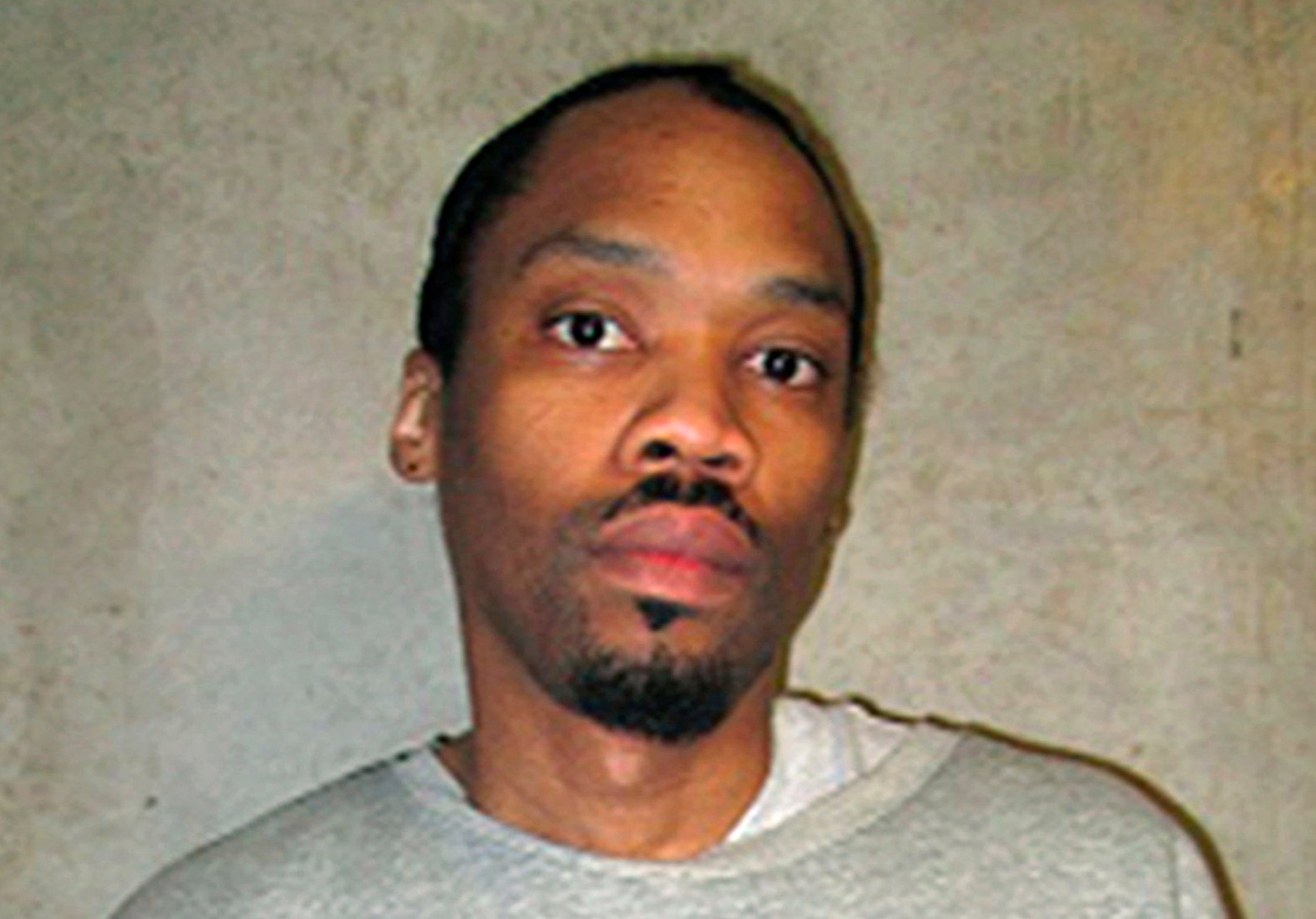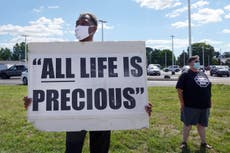Oklahoma defends first execution in six years, while critics say it was ‘torture’
Oklahoma hadn’t executed anyone in six years, after a series of botched killings in 2014 and 2015, writes Josh Marcus
Your support helps us to tell the story
From reproductive rights to climate change to Big Tech, The Independent is on the ground when the story is developing. Whether it's investigating the financials of Elon Musk's pro-Trump PAC or producing our latest documentary, 'The A Word', which shines a light on the American women fighting for reproductive rights, we know how important it is to parse out the facts from the messaging.
At such a critical moment in US history, we need reporters on the ground. Your donation allows us to keep sending journalists to speak to both sides of the story.
The Independent is trusted by Americans across the entire political spectrum. And unlike many other quality news outlets, we choose not to lock Americans out of our reporting and analysis with paywalls. We believe quality journalism should be available to everyone, paid for by those who can afford it.
Your support makes all the difference.The state of Oklahoma is defending its first execution after a six-year moratorium, even as critics said it went horribly wrong, with inmate John Marion Grant writhing for minutes of “torture” before finally being pronounced dead.
Grant, who was given a death sentence in 1999 for fatally stabbing cafeteria worker Gay Carter while in prison, was killed on Thursday afternoon via lethal injection, a protocol he and other inmates sued the state to challenge, arguing in a still-ongoing federal lawsuit that it is an unconstitutional cruel and unusual punishment.
He began showing visual signs of distress after being injected with midazolam, a drug the death row prisoners argue in their suit doesn’t do enough to properly sedate people during executions. “He began convulsing about two-dozen times, full-body convulsions, and began to vomit, which covered his face and began to run down his neck and the side of his face,” said Associated Press reporter Sean Murphy, one of the witnesses to the execution.
An Oklahoma Department of Corrections spokesperson declined to answer in-depth questions about the execution from The Independent, but said, “Inmate Grant’s execution was carried out in accordance with Oklahoma Department of Corrections’ protocols and without complication.”
Governor Kevin Stitt also would not comment on the specifics of the execution, but praised the killing, in a statement to The Independent, because it “delivered justice to Gay Carter’s family”.
Pam Carter, Gay Carter’s daughter, was also supportive of the execution, telling News 4, ““It is about keeping another person safe. I want to make sure that this does not happen to anybody else, that nobody has to go through what I and my family has had to go through.”
The state of Oklahoma, home to one of the nation’s most prolific execution chambers, paused executions for years after a series of botched killings in 2014 and 2015, and critics say the state still hasn’t learned its lesson after pushing to resume the practice.

“Oklahoma’s lethal injection protocol amounts to torture and human experimentation,” death penalty activist Sister Helen Prejean said. “In almost 40 years working against the death penalty, I have never heard of a person vomiting while being executed.”
On Thursday, protestors surrounded the McAlester, Oklahoma, prison where executions take place.
“This up and down, topsy turvy that puts the victim’s families, the family of the prisoner, the prison and the prison guards, and everybody through this roller coaster of emotion and trauma, and it’s unnecessary,” Abraham Bonowitz, the director of Death Penalty Action, told KFOR.
Civil rights advocates hammered the state for resuming executions against death row inmates, even as they have a trial in their constitutional lawsuit set for February of next year.
On Wednesday, a federal Tenth Circuit appeals court held that the executions should stop until the end of the trial, writing in its ruling that men like Grant and other Oklahoma inmates would “risk being unable to present what may be a viable Eighth Amendment claim to the federal courts before they are executed using the method they have challenged”.
That scenario came to pass a day later, after the Supreme Court agreed with an emergency appeal from Oklahoma attorney general John O’Connor, who called pausing the executions a “grievous error”.

“Based on the reporting of the eyewitnesses to the execution, for the third time in a row, Oklahoma’s execution protocol did not work as it was designed to,” said Dale Baich, who represents plaintiffs in the constitutional suit against Oklahoma, in a statement. “This is why the Tenth Circuit stayed John Grant’s execution and this is why the US Supreme Court should not have lifted the stay. There should be no more executions in Oklahoma until we go to trial in February to address the state’s problematic lethal injection protocol.”
Oklahoma hasn’t executed anyone since a series of high-profile errors in the execution chamber.
In April 2014, it took executioners 17 attempts to set an IV line on Clayton Lockett, who began moaning, groaning, and attempting to speak after he was supposed to be unconscious. Witnesses were ushered out and a curtain was pulled over the death chamber, where Lockett died of a heart attack. A 2015 autopsy revealed he had accidentally been given the wrong execution drug.
That same year, Charles Warner told onlookers “my body is on fire” during his execution in January, which mistakenly used the same wrong drug, potassium acetate, that had killed Lockett.
By September, Oklahoma was about to bungle a third killing, that of Richard Glossip, before then-governor Mary Fallin called off the execution at the least minute after she learned he too was about to be injected with the incorrect poison. Glossip came within two hours of death. He remains on death row.
In 2020, Oklahoma said it was ready to resume executions and had tightened its safety protocols around executions. Critics say the state retains the same three-drug cocktail that makes inmates feel like they’re being “burned alive” during executions, and that it doesn’t disclose the suppliers of its injection materials, raising concerns.
Julius Jones is the next man set to be killed by Oklahoma. His execution is scheduled for 18 November.
Jones, who was given the death penalty for the 1999 murder of businessman Paul Howell in the Oklahoma City suburbs, has maintained his innocence for two decades, inspiring a growing “Justice for Julius” movement of supporters pushing for his release.

Thanks to an inept public defense team, Jones never testified in his own trial, and will have the chance to address authorities for the first time during a clemency hearing on Monday, his last form of available legal appeal before his execution. Oklahoma governor Stitt has said he’ll make his final clemency decision after the hearing, which has been rescheduled and subject to ever-changing legal appeals.

“I feel let down. It kind of just hurts my feelings that people can just dangle somebody’s life like that,” Jabee Williams, a Justice for Julius organiser and friend of the Jones family, told The Independent. “He’s going to be human again when he gets to speak. It’s hard for a person to commit an act of anything – violence, murder, death – to somebody you see as human, unless they’re evil. At that point, whenever he gets to speak, and they understand that he’s human, and that he has something to offer the world, I think that’s going to change the hearts of so many people.”
The Independent and the nonprofit Responsible Business Initiative for Justice (RBIJ) have launched a joint campaign calling for an end to the death penalty in the US. The RBIJ has attracted more than 150 well-known signatories to their Business Leaders Declaration Against the Death Penalty – with The Independent as the latest on the list. We join high-profile executives like Ariana Huffington, Facebook’s Sheryl Sandberg, and Virgin Group founder Sir Richard Branson as part of this initiative and are making a pledge to highlight the injustices of the death penalty in our coverage.





Join our commenting forum
Join thought-provoking conversations, follow other Independent readers and see their replies
Comments